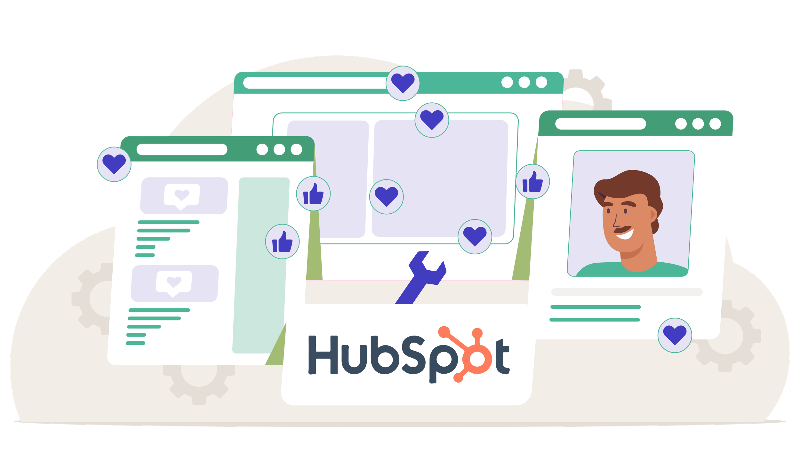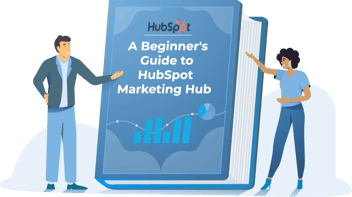Discover how HubSpot Marketing Hub can revolutionize social media marketing. Automate multi-channel postings and leverage AI to maximize engagement.
Is PPC The Right Social Media Advertising Strategy For You? [Video]
There was a time when marketers tried to make sales by interrupting their customers.
Old-style outbound marketing methods like radio and TV ads, telemarketing, direct mail, trade shows, and cold calls still work; they can yield a good ROI if done right. But outbound marketing needs more precision and finesse than pay-per-click (PPC) advertising.
 PPC is the advertising model in which the advertiser pays for each click on an image or a link. Unlike passive inbound marketing strategies that provide background information for customers at the top of your sales funnel, PPC is a more finely tuned inbound marketing strategy that induces potential customers who intend to buy a product to click on a link that takes them to your website. This article will answer the three questions every marketer needs to know to successfully use pay-per-click social media advertising.
PPC is the advertising model in which the advertiser pays for each click on an image or a link. Unlike passive inbound marketing strategies that provide background information for customers at the top of your sales funnel, PPC is a more finely tuned inbound marketing strategy that induces potential customers who intend to buy a product to click on a link that takes them to your website. This article will answer the three questions every marketer needs to know to successfully use pay-per-click social media advertising.
"With the ability to track ROI and adjust in real-time, PPC advertising on social media is a cost-effective way to engage a target audience in highly-tailored, personalized campaigns."
How Does Social Media PPC Advertising Work?
Social media ads are a versatile advertising option that enables marketers to build campaigns across various social media platforms. Marketers can create different campaigns for different objectives. Because social media platforms collect enormous amounts of user data, ads present highly personalized, actionable content. This introduces your brand to more customers while it boosts conversion opportunities.
It's hard to find a social media platform that does not offer paid advertising. But with so many social media networks, how do you select your best network?
The first thing to understand about social media PPC advertising is that consumers are not using a term popular with social media advertising experts, "platform-agnostic," to get information for their purchase decisions. Consumers tend to get the information they use to purchase from a single platform and stick with it. Choosing the right platform for placing your ads (or having a consultant who knows your market well) is essential for a successful social media campaign.
You need to know which platform your customer pool uses to choose the right social media platform. You need to know what kind of campaign you want to do. It would be best if you established metrics of success for your campaign. You also need to set your budget for your ad campaign.
Each social media platform has unique advertising potential.
-
Facebook is the world's premier social media platform. In December 2022, Facebook had 2.895 billion users, over a third of the planet's population. Almost 99 percent of Facebook users access their accounts on mobile devices. Facebook doesn't just have an enormous potential audience on which it has in-depth personal data to empower detailed demographic options; it also is highly visual, lending itself to the imagery that stimulates sales.
-
Instagram, with over 2 billion users, is a more visual medium, with algorithms encouraging users to view as many images as possible. You can use Instagram to display your product's or service's unique qualities with high-quality still images or videos.
-
LinkedIn is an excellent choice for B2B campaigns. No other platform reaches more people in professional positions. Your LinkedIn ads can reach decision-makers who make corporate buying decisions.
-
Pinterest brings a predominantly female audience to social media. It has become the go-to site for people interested in weddings, fashion, and haute cuisine.
-
TikTok reaches about 31 million users daily on iOS and 14 million on Android devices in the US alone. The average user under 18 is on TikTok 87 minutes a day. TikTok isn't just for young people, however. About 11 percent of TikTok users are over the age of 55. TikTok is a great place to communicate an emotional message.
-
Twitter is currently in flux, but it has easy-to-use tools that allow advertisers to persuade users to download apps. It has algorithms for driving conversions and collecting leads.
Each platform has its own best practices and advertising guidelines. Please do your homework before you put your ads on any social media platform.
You Might Also Like This Post:
When Does PPC Work Best?
You've got many options for your online marketing channels. You can rely on SEO, PPC, or social media—although nearly every Internet business receives the highest ROI with the most reliable returns using various methods. But there are times when PPC is your best social media strategy, such as these:
-
Your product, service, or site isn't appearing in search results (at least not yet). Every Internet marketer knows you must build your site before Google can find it. You must create authority and content before your site will appear in organic search results. PPC gets you to the top of the SERPs, even while you are still working on SEO.
-
You're focusing on the bottom of your sales funnel. Organic search brings in visitors in the information-gathering phase of their sales journey. PPC brings in customers who have established their intent to purchase, not necessarily to buy your product. PPC helps you focus your efforts on the customers who will most likely make a purchase decision immediately.
-
You want results right away. PPC is the best tool for immediate returns on your advertising investment. It's a good choice when creating a time-sensitive event, such as a sale or rolling out a new product.
-
You want precise targeting of your marketing efforts.
Social media platforms have comprehensive data about your potential customers, far more than can be gleaned from their search history. PPC is a great choice when your data analysis is on point and you know your customers inside and out.
How Can You Make Sure You Get the Most ROI from PPC?
There are many advantages to PPC for social media advertising, but success isn't automatic. Every PPC campaign for social media advertising has certain essential elements of success.
-
A budget is required. SEO can be a do-it-yourself project, requiring no investment other than your knowledge of SEO and your time in choosing and monitoring your keywords. PPC, on the other hand, always involves cash. You need to allocate a budget to PPC campaigns and monitor results to ensure you're getting an adequate return on investment.
-
Clicks don't always lead to conversions. You won't make a sale every time someone clicks on your link on social media. Ideally, you should A/B test your social media ads and monitor your results frequently.
-
PPC takes preparation time. You will need to work to identify the market segment most likely to convert when they click on your ad. Successful social media marketing campaigns are never one-and-done.
-
Winning with PCP takes real skill. Nobody gets maximum returns from their first campaign. Making money with PPC requires skill and constant fine-tuning.
Many businesses rely on the skills of a PPC expert. Aspiration Marketing can help you ensure your social media advertising campaigns grow with your company. We help you overcome design hurdles to get the highest return on your advertising dollars.
This content is also available in:
- German: Ist PPC die richtige Social Media-Werbestrategie für Sie? [Video]
- Spanish: PPC en redes sociales: ¿es la estrategia ideal para usted?
- French: PPC sur les réseaux sociaux : la bonne stratégie ?
- Italian: Pubblicità PPC sui social: è la strategia giusta per voi? [Video]
- Romanian: PPC în social media: Este o strategie potrivită pentru dvs.? [Video]
- Chinese: PPC 是适合您的社交媒体广告策略吗?视频





.webp?width=352&name=Could-PPC-Be-the-Secret-to-Success-for-Immediate-Results%20(1).webp)
Leave a Comment